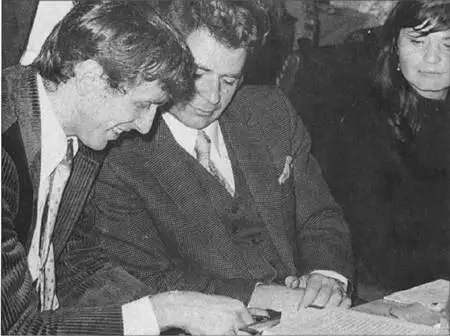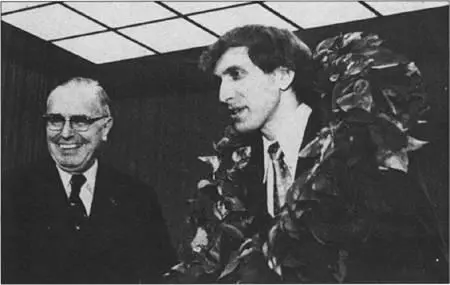So Reykjavik was a cold war confrontation in this sense: It illustrated the tension within détente and the strains that led to the policy’s breakdown within three years. Fischer-Spassky smacked of both the continuing divide in politics and society and the suspicion and enmity that infused relations across the Iron Curtain. The separate territory kept to by the Soviet team, with all their customary watchfulness and suspicions, their lack of experience in dealing with the press, the go-go aggression of the Fischer staff, the tendency of the Western officials and Americans to make unilateral decisions and then to present them to the Soviets, the stereotyping by Western journalists of the Soviet team—all these reflected the cold war and directly affected the match.
Our two heroes also dramatized the contradictions of the era. For Spassky, Reykjavik was supposed to be a feast of chess, a celebration to be shared with friendly rivals. As for Fischer, in victory he had no doubt about the implications of his win. He said he could crush anyone the Soviets threw at him: “The Russians are wiped out.” He was delighted to have seized the title from the Soviet Union. “They probably now feel sorry they ever started playing chess,” he told the BBC. “They had it all for the last twenty years. They talked of their military might and their intellectual might. Now the intellectual thing… it’s given me great pleasure… as a free person… to have smashed this thing.”
Of course, as it turned out, news of the cold war’s death was greatly exaggerated. But if Fischer had not been so anti-Soviet and mercurial, if he had been as convivial as Spassky, the match might even have gone down in history as symbolizing détente.
22. UNEASY LIES THE HEAD THAT WEARS THE CROWN
Nothing except a battle lost can be half as melancholy as a battle won.
— DUKE OF WELLINGTON
Fame is when you stop signing and start autographing.
— BILLY WILDER
 With the match over and Fischer wrapped in triumphalism, the organizers were still unable to relax. His absence at the opening ceremony had been a catastrophe; now they worried that the new world champion would ignore the final dinner. Worn down by two months of Fischerism, Gudmundur Thorarinsson was almost reconciled to this. Fred Cramer fed the doubts. He thought his man should be crowned in his hotel room: “I cannot see Bobby sitting quietly through a load of speeches.”
With the match over and Fischer wrapped in triumphalism, the organizers were still unable to relax. His absence at the opening ceremony had been a catastrophe; now they worried that the new world champion would ignore the final dinner. Worn down by two months of Fischerism, Gudmundur Thorarinsson was almost reconciled to this. Fred Cramer fed the doubts. He thought his man should be crowned in his hotel room: “I cannot see Bobby sitting quietly through a load of speeches.”
Euwe, Schmid, and Thorarinsson met for a drink at the hotel Esja before the ceremony. A journalist asked Schmid whether he would arbitrate another match. “I would have to have a long think about that,” was the cautious response. Euwe thought the best thing about the match was that it was over. Corriere della Sera completed its coverage of Fischer-Spassky as though it had been a fairy tale: “Good night, Fischer; good night, Spassky; good night to the enchanted island of Iceland.”
China’s newly appointed ambassador to Iceland, Chen Tung, was one of many delighted that the match was finally over. Chen Tung had a long-standing booking of the presidential suite in the Loftleidir, expecting the match to have concluded. So as not to cause a diplomatic row, the hotel had approached Cramer, wondering whether, in view of Chen Tung’s prior reservation, Fischer might be willing to move to another suite. “We are not prepared to discuss anything but chess at the moment,” the panjandrum shot back. “Bobby cannot be bothered with the problems of the Chinese ambassador.” For Chen Tung, there was always the option of the other main luxury hotel in town, the Saga. But that was where the representatives of China’s ideological foe—the Soviets—were quartered.
For the closing dinner at the Laugardalsholl on Sunday, 3 September (price $22 a head), a Viking theme had been chosen. The waiters wore plastic Viking hats. Guests could feast on barbecued suckling pig and spitted mountain lamb, washed down with Viking’s Blood, a potent concoction unknown to Vikings and containing wine, cognac, orange juice, and lemonade. The meal began on time at seven P.M. Spassky was there, as were Schmid, Thorarinsson, Euwe, the minister of finance Halldor Sigurdsson, and over 1,200 other people. In a reprise of the opening ceremony, Fischer’s place was vacant.
Virtually an hour late, at 7:55 P.M., as the band on stage was striking up the chess federation’s anthem, the guest of honor finally appeared, garbed in a violet velvet suit. Harry Golombek wrote that it “must have been made of samite, mystic, wonderful….” A standing ovation greeted the new champion. He took his place to the right of Max Euwe; Spassky was on Euwe’s other side. The FIDE president rose to deliver one of several speeches that night. Fischer promptly shuffled into the vacated seat, reached into his jacket, took out a pocket chess set, and showed Spassky the adjourned position from their final game. It must have been the last thing the weary ex-champion wanted to see, though he maintains today that he was unperturbed by Fischer’s behavior. In any case, he dutifully followed the analysis, from time to time adding comments of his own.
At issue was whether Spassky could have survived with a draw by sealing an alternative move before the adjournment. Fischer thought not.
A crowd gathered around their table. Fischer finally noticed them and turned to his friend and bodyguard. “Hey, Sammy, get these guys outta here.”
It was Thorarinsson’s task to hand over the checks. For the victor, this was a sum of $76,123—two-thirds of $125,000. An equal amount awaited transfer from the United Kingdom—Jim Slater’s money, the donation that had saved the match.
Fischer made no speech of thanks, no graceful comment on the hard work that had gone into the long contest, no tribute to his defeated opponent. Taking his prize, he immediately tore open the envelope and closely scrutinized the contents for several minutes, checking the figure. Satisfied, he then returned to his seat.
Chester Fox came into his own at last, filming everything in sight, probably motivated as much by one-upmanship as profit. There was dancing until one A.M. Fischer boogied awkwardly with two young Icelandic women, Anna Thorsteinsdottir, eighteen, and her friend Inga, seventeen—the papers the next day called them “beautiful Icelandic blondes.” Palsson had arranged their tickets. (He and Fischer had been eating in a restaurant when he had seen them gawking at Fischer and invited them to the banquet. The two women had even been back to the American’s room late at night to listen to rock music.) They denied rumors that there was any romance. “He has been very nice to us, but there is nothing in it. You couldn’t interest him in girls because he’s married to chess.”

You were lost whatever you did. CHESTER FOX

CHESTER FOX
To end the formalities, there was still one final reception, given by the government at the president’s official residence. Palsson drove Fischer there: this time, amazingly, they were early. “When Bobby saw that the ministers were arriving after him, he took me to one side and said, ‘Saemi, how did you manage to get me here on time?’” Iceland’s rock ‘n’ roll policeman had cracked it. While Fischer was in the shower, he had put the wall clock, the clock on the table, and the champion’s wristwatch all forward by an hour. “‘Oh,’ Bobby said, ‘that was a great move!’ Sometimes you could say or do anything. But if he’d been in a bad mood, he could have erupted, maybe left, maybe gone straight back to America.”
Читать дальше

 With the match over and Fischer wrapped in triumphalism, the organizers were still unable to relax. His absence at the opening ceremony had been a catastrophe; now they worried that the new world champion would ignore the final dinner. Worn down by two months of Fischerism, Gudmundur Thorarinsson was almost reconciled to this. Fred Cramer fed the doubts. He thought his man should be crowned in his hotel room: “I cannot see Bobby sitting quietly through a load of speeches.”
With the match over and Fischer wrapped in triumphalism, the organizers were still unable to relax. His absence at the opening ceremony had been a catastrophe; now they worried that the new world champion would ignore the final dinner. Worn down by two months of Fischerism, Gudmundur Thorarinsson was almost reconciled to this. Fred Cramer fed the doubts. He thought his man should be crowned in his hotel room: “I cannot see Bobby sitting quietly through a load of speeches.”












